Zetta Elliott's Blog, page 64
July 25, 2013
Canadians in Cambridge
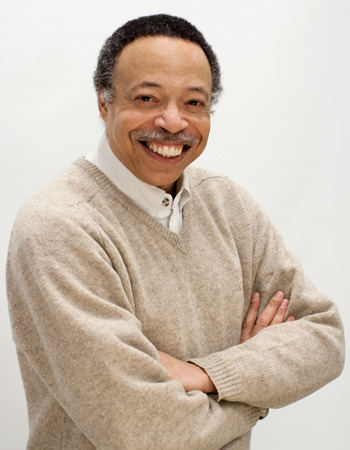 This morning I received an invitation from George Elliott Clarke , Toronto’s Poet Laureate, to participate in the Canada Seminar at the Weatherhead Center for International Affairs at Harvard University. George, who is the E.J. Pratt Professor of Canadian Literature at the University of Toronto, will be William Lyon Mackenzie King Visiting Professor of Canadian Studies and Canada Seminar Chair for the coming academic year.
This morning I received an invitation from George Elliott Clarke , Toronto’s Poet Laureate, to participate in the Canada Seminar at the Weatherhead Center for International Affairs at Harvard University. George, who is the E.J. Pratt Professor of Canadian Literature at the University of Toronto, will be William Lyon Mackenzie King Visiting Professor of Canadian Studies and Canada Seminar Chair for the coming academic year.
The Canada Seminar examines Canadian social, economic, cultural, and political issues in their domestic and international dimensions. Presentations are made by public figures, scholars, artists, and experts in various fields to provide Harvard faculty and students, and the broader community, a look at Canadian scholarly and public life. It seeks to enhance the understanding of one of the United States’ closest allies and largest trading partners, and to provide a forum for the lively exchange of ideas on a wide range of issues. Because Canada and the United States must respond to similar economic and social challenges with distinctly different frameworks and historical legacies, the study of Canadian issues offers rich opportunities for scholars engaged in comparative studies. The seminar has presented numerous distinguished speakers including Canadian Supreme Court Justice Madame Rosalie Abella; political philosophers, Charles Taylor and Will Kymlicka; Matthew Teitelbaum, director and CEO of the Art Gallery of Ontario; and interim leader of the Liberal Party of Canada, the Honorable Bob Rae.
Needless to say, the lineup will look very different while George is at Harvard! My talk, “The (Revolving) Door of No Return: Memory, Migration, & Magical Thinking,” will take place on February 24, 2014.


July 22, 2013
waiting in vain
 Every time the crises facing our youth make the news, I wait (in vain) for the children’s literature community—and its institutions especially—to issue a statement about their commitment to social justice. But the truth is, many in the kidlit community here in the US are NOT committed to social justice and so perhaps feel it is “not their place” to comment on the murder of Trayvon Martin and the problematic profiling of so many youth of color. As scholar/urban librarian Vanessa Irvin Morris points out on her blog,
Every time the crises facing our youth make the news, I wait (in vain) for the children’s literature community—and its institutions especially—to issue a statement about their commitment to social justice. But the truth is, many in the kidlit community here in the US are NOT committed to social justice and so perhaps feel it is “not their place” to comment on the murder of Trayvon Martin and the problematic profiling of so many youth of color. As scholar/urban librarian Vanessa Irvin Morris points out on her blog,
…any librarian who is worth their education in gold, will at times, embrace a social stance for justice, that will be based on belief and experience – not someone else’s facts and references. We’re talking about real life here, and librarians do live it. If a librarian tells you otherwise – go to another library. Seriously.
I’ve been in a funk lately and felt I ought to write something about the verdict but didn’t really have much to say. There’s a lot of commentary out there, but I was gratified to see my HuffPo article, “Trayvon—Killed by an Idea,” reposted by some friends on Facebook. Over a year ago I wrote,
Imagine what it might mean if those same professionals took a moment to consider what they owe Trayvon Martin and all the other teens of color who don’t see themselves reflected in young adult literature. Imagine what it might mean if they realized that a broader range of images in books might have created a different set of assumptions in the mind of George Zimmerman (or Anders Breivik). I wish publishers recognized that they have the power to help undo the distortions that are destroying our youth.
I feel like I write the same thing over and over again and nothing seems to change. Fortunately, my friend Swati Khurana directed my attention to this encouraging blog post in which a white reader testifies to the power of books she read as a child to foster empathy for others who seem different. In “I Am Not Trayvon Martin. But I Can Be in My Imagination. And That Would Have Made All the Difference,” she writes:
Of course, like all of us, I look at the world through the prism of my experience and who I am. But literature helps me move beyond that “bubble of me” and look at how life is for someone else…So I can be Trayvon Martin in my imagination. I can put myself in his place. He isn’t “other” to me, even though I am a middle aged White woman.
I wish George Zimmerman could have been Trayvon in his imagination. That he could have looked carefully beyond his first impression. That he could have thought about whether he was scaring Trayvon by doing what amounted to stalking him. If he could have seen Trayvon as a kid, not as a “an asshole” or a “f*cking punk”.
I think my study of Literature helps me do this. But Literature is just stories. And sometimes powerful stories just come out of people’s mouths. Or appear on sites like this one. We need to listen. Not just to the words. But to use our imagination to truly feel what another person might feel, how another person’s experience and frame of reference might be different from yours, how you might be making a mistake in the way you are judging someone else.
Amen.
(AP Photo/Gerald Herbert)


July 18, 2013
thin-skinned
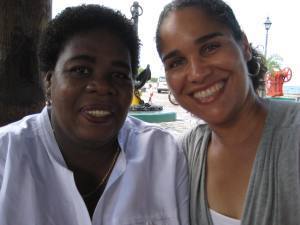 My dad used to call me “Krissy.” It drove me nuts, especially since I stopped going by that name when I was 12. Everyone else in my family made the switch (to Kris or Kristin), but my father just refused and that meant everyone in his world also referred to me as “Krissy” and assumed it was okay. When I went to Nevis last year (at the age of 39) I explained to my aunt and my cousin that I preferred to be called “Zetta” and they made a conscious effort to honor my preference. This year my aunt called me “Krissy” several times but remembered to say “Zetta” when she was asked to stand and introduce me to the congregation during Sunday service. I didn’t bother to correct her whenever she slipped up because I was grateful that when I walked through the front door of her home my aunt didn’t call me fat. When we embraced she did let her hands linger on my waist to take a quick, silent measurement, but then we sat down to lunch and simply enjoyed each other’s company. That was Thursday. On Sunday I went to church with my aunt and when the service ended, my aunt’s sister-in-law dashed up to the front to shake my hand. She seemed to be in a hurry but took time to say, “You got fat!” before laughing and rushing away. My cousin also left church in a hurry so I called her the next day. She started with a couple of complaints: 1) it was Monday and I’d been on the island for five days without contacting her, and 2) I was paying money to stay in a hotel when she told me last year I was welcome to stay with her. Then she said, “You’re SOOOO fat!” And there wasn’t any laughter until I said, “I knew you were going to say that.” Then she laughed, I steered the conversation in another direction, and we moved on. Before I boarded the ferry to leave Nevis yesterday, another cousin made time in her busy schedule to stop by and say a quick hello. We embraced, I said, “You look great!” and she said casually, “You’ve put on a little weight.” I told her she was the third person to point that out, and then we spent the next few minutes catching up.
My dad used to call me “Krissy.” It drove me nuts, especially since I stopped going by that name when I was 12. Everyone else in my family made the switch (to Kris or Kristin), but my father just refused and that meant everyone in his world also referred to me as “Krissy” and assumed it was okay. When I went to Nevis last year (at the age of 39) I explained to my aunt and my cousin that I preferred to be called “Zetta” and they made a conscious effort to honor my preference. This year my aunt called me “Krissy” several times but remembered to say “Zetta” when she was asked to stand and introduce me to the congregation during Sunday service. I didn’t bother to correct her whenever she slipped up because I was grateful that when I walked through the front door of her home my aunt didn’t call me fat. When we embraced she did let her hands linger on my waist to take a quick, silent measurement, but then we sat down to lunch and simply enjoyed each other’s company. That was Thursday. On Sunday I went to church with my aunt and when the service ended, my aunt’s sister-in-law dashed up to the front to shake my hand. She seemed to be in a hurry but took time to say, “You got fat!” before laughing and rushing away. My cousin also left church in a hurry so I called her the next day. She started with a couple of complaints: 1) it was Monday and I’d been on the island for five days without contacting her, and 2) I was paying money to stay in a hotel when she told me last year I was welcome to stay with her. Then she said, “You’re SOOOO fat!” And there wasn’t any laughter until I said, “I knew you were going to say that.” Then she laughed, I steered the conversation in another direction, and we moved on. Before I boarded the ferry to leave Nevis yesterday, another cousin made time in her busy schedule to stop by and say a quick hello. We embraced, I said, “You look great!” and she said casually, “You’ve put on a little weight.” I told her she was the third person to point that out, and then we spent the next few minutes catching up.
Now I have gained weight since last year—I know that. And I know that I am a highly sensitive person (HSP); my feelings bruise easily and I have had to learn not to let careless or unkind remarks get to me. I wouldn’t say I’ve traveled widely, but I have seen a bit of the world and I have to say that I have never visited a place where people felt entitled to call me fat. I grew up in a household where one man (my athletic father) felt he had the right to police the weight of everyone else (his wife and two daughters). He used to pinch me and my sister and say, “You’ve got an inch to pinch!” The message being that “good” bodies had no excess fat—bad news for a pudgy kid like me. Because I was so eager to please my father, as a child I learned to do the things he approved of—I was active in sports and I even went on a liquid diet when my dad started selling Herbalife products. I was an adult when my mother shared some of the insensitive and cruel things my father said to her about her weight prior to their divorce. I’m 40 now and I’ve never known a time when my mother wasn’t on a diet. It can be damaging to girls when they see their mothers being self-critical; I shared this important letter with my mother and she didn’t even (know how to?) respond. By the time I was a teenager I had decided I would never count calories or let food dominate my life. My siblings are rather image-conscious and I also decided I wasn’t going to obsess over the way I look; I figured if people truly liked me, they’d have to accept me as I am. I could afford to hold those attitudes when I was in my 20s, but in my 30s I started to gain weight and I know that my metabolism has changed. If I don’t exercise 3x a week, the pounds pile on and I become the pudgy girl my father feared would become obese (just like her mother).
I come from a family of big women; my great-grandmother Jenny Hobbs was a tall, big-boned Irish-Canadian woman and many of my relatives on that side of the family struggle with maintaining a healthy weight. But what I love about my mother’s family is that NO ONE ever makes insensitive remarks about size. It’s natural to notice changes in a person you haven’t seen in some time, but in North American culture it is rude and hurtful to blurt out observations about weight. I understand that Caribbean culture is different, but I’m not willing to give folks a pass on this. I hate to take it to Dr. Phil, but he’s right when he says, “You teach people how to treat you.” Calling a woman fat is an act of aggression—that’s how I see it. It’s not a compliment, it’s not an expression of concern. It’s a way of taking a swipe at someone without accepting accountability. Just because you laugh when you say it doesn’t make it a harmless joke. And yes, this is a particular trigger for me but it’s also part of a larger cultural problem that turns women’s bodies into public property to be ogled, judged, and handled without care.
When I think about moving to the Caribbean, I think about having to surrender my privacy—those spaces/stretches of solitude that enable me to dream, to heal, to write. Could I really live on a small island as an HSP? As a feminist and an artist? When my aunt stood to introduce me during church last Sunday, the pastor welcomed me and said, “I met your father, I believe. You look like him.” Which put a huge smile on my face because no one ever says that. My father called me a “stranger in the family” because of my attitudes and ideas, but he could have been talking about my appearance. Aside from my wide hips, I don’t share certain physical traits that mark the members of my “clan.” And I don’t share their belief that blood is thicker than water. If you mistreat me or disregard my boundaries, I’ll leave and/or cut you out of my life. I can afford to do that because I have so many wonderful friends and extended family members who accept me unconditionally. But where do you go when land is limited and friends are far away? My aunt’s pastor came up to me after the service to ask what brought me back to Nevis. I told him I was doing research for a book and he told me he was also writing a book—on the sanctimony of marriage. I managed a diplomatic reply: “You must have found the recent Supreme Court rulings interesting.” But then he started pulling at his side as he explained that woman was taken from Adam’s rib, and it’s “womb-man,” etc. I said, “No doubt a well-read man like yourself has heard that ‘biology isn’t destiny.’” He said he had, and I said we would have to leave it there since we’re clearly on opposite sides of that argument. If I lived in Nevis, I wouldn’t attend church and I doubt I’d have many conservative people in my life. That might mean that I’d have a very small circle of friends! After Ghana I realized that there aren’t many places in the world for a single, child-free black feminist like me, which is a rather sobering realization…


July 16, 2013
roots
 It’s hotter in NYC than it is here in Nevis. For the past three mornings I’ve woken before dawn to the sound of pouring rain. Then the rain stops as suddenly as it started, the clouds pass, the sun comes out, and when I finally open the door there’s a beautiful breeze blowing in off the blue, blue sea. I realized a few days ago that I painted my front room the color of the sea. I don’t have many vibrant colors in my home, nothing that might look distinctly Caribbean. Yesterday evening my cousin Charlene drove us around the island and I couldn’t help but notice how beautiful the homes are—they’re immaculately painted in sorbet colors and most yards are very tidy with lots of flowering shrubs. Land is a big deal here in Nevis—owning it, buying it, selling it. Land is a form of legitimacy; I can remember my father grumbling about the land he never inherited from his grandfather and father. Buying land wouldn’t make me an automatic insider; lots of expats come here and earn citizenship by purchasing million-dollar villas that they only occupy for a couple of weeks. But my other cousin is looking to sell some of her land and there’s a part of me that would like to hold onto land that’s been in my family for generations—land that somehow eluded my father’s grasp. We passed my great-grandparents’ house last night, the house my father grew up in, and it’s fallen into total disrepair since being sold. That never would have happened had it stayed in “family hands.” The other part of me doesn’t want to be a landowner—not here, not anywhere. I don’t want to be bound to any one place. I still have my dream of opening a slavery museum here in Nevis, but for the most part I lack that very Caribbean drive to own a
It’s hotter in NYC than it is here in Nevis. For the past three mornings I’ve woken before dawn to the sound of pouring rain. Then the rain stops as suddenly as it started, the clouds pass, the sun comes out, and when I finally open the door there’s a beautiful breeze blowing in off the blue, blue sea. I realized a few days ago that I painted my front room the color of the sea. I don’t have many vibrant colors in my home, nothing that might look distinctly Caribbean. Yesterday evening my cousin Charlene drove us around the island and I couldn’t help but notice how beautiful the homes are—they’re immaculately painted in sorbet colors and most yards are very tidy with lots of flowering shrubs. Land is a big deal here in Nevis—owning it, buying it, selling it. Land is a form of legitimacy; I can remember my father grumbling about the land he never inherited from his grandfather and father. Buying land wouldn’t make me an automatic insider; lots of expats come here and earn citizenship by purchasing million-dollar villas that they only occupy for a couple of weeks. But my other cousin is looking to sell some of her land and there’s a part of me that would like to hold onto land that’s been in my family for generations—land that somehow eluded my father’s grasp. We passed my great-grandparents’ house last night, the house my father grew up in, and it’s fallen into total disrepair since being sold. That never would have happened had it stayed in “family hands.” The other part of me doesn’t want to be a landowner—not here, not anywhere. I don’t want to be bound to any one place. I still have my dream of opening a slavery museum here in Nevis, but for the most part I lack that very Caribbean drive to own a  home. Or in the case of Nevis, to buy some land and build a home. Yesterday my cousin Beverley and I took a guided tour of the Montravers Estate (once managed by the infamous Huggins ordered 32 enslaved people to be taken to town and publicly whipped). It was amazing to following the path into the rainforest and suddenly come upon evidence of another era—a stone bridge or crumbling wall. The Huggins family eventually sold the estate to the Pinney family (another prominent slave- and landowning family) but over time it fell into other hands. Now a descendant of the Pinney family has bought the estate back and there’s talk of turning it into a hotel. Will they preserve the existing structures? I’d hate to see them destroyed and yet I don’t want white tourists living out their Gone with the Wind fantasies on this terrain. It’s sacred ground—to me, at any rate. As we walked along the rock-strewn path I couldn’t help but wonder who had walked there centuries ago. This was my
home. Or in the case of Nevis, to buy some land and build a home. Yesterday my cousin Beverley and I took a guided tour of the Montravers Estate (once managed by the infamous Huggins ordered 32 enslaved people to be taken to town and publicly whipped). It was amazing to following the path into the rainforest and suddenly come upon evidence of another era—a stone bridge or crumbling wall. The Huggins family eventually sold the estate to the Pinney family (another prominent slave- and landowning family) but over time it fell into other hands. Now a descendant of the Pinney family has bought the estate back and there’s talk of turning it into a hotel. Will they preserve the existing structures? I’d hate to see them destroyed and yet I don’t want white tourists living out their Gone with the Wind fantasies on this terrain. It’s sacred ground—to me, at any rate. As we walked along the rock-strewn path I couldn’t help but wonder who had walked there centuries ago. This was my second hike in the rainforest and once again I was struck by the quiet. The estate is secluded and so the 90-minute walk was rather serene and largely bug-free except for ants and donkey spiders, which fortunately remained hidden inside their burrows. We stopped for a mango break and then went on until we were standing before the ruins of a three-storey stone building. The counting house was also standing and the kitchen’s brick chimney. We walked without talking so as not to disturb the nearby hive and saw the rusted iron evidence of sugar production (a plow, coppers for boiling), all overgrown by plants and vines. What does it mean to own a piece of the past? If it were up to me, I’d have the estate designated a national heritage site. I’d love for there to be a working sugar plantation in Nevis. It would be a huge tourist draw but unlike a hotel, it wouldn’t cast Afro-Caribbean people in the role of servants to wealthy whites. Instead they would serve as docents who could educate tourists (and locals) about plantation life—the reality, not the fantasy.
second hike in the rainforest and once again I was struck by the quiet. The estate is secluded and so the 90-minute walk was rather serene and largely bug-free except for ants and donkey spiders, which fortunately remained hidden inside their burrows. We stopped for a mango break and then went on until we were standing before the ruins of a three-storey stone building. The counting house was also standing and the kitchen’s brick chimney. We walked without talking so as not to disturb the nearby hive and saw the rusted iron evidence of sugar production (a plow, coppers for boiling), all overgrown by plants and vines. What does it mean to own a piece of the past? If it were up to me, I’d have the estate designated a national heritage site. I’d love for there to be a working sugar plantation in Nevis. It would be a huge tourist draw but unlike a hotel, it wouldn’t cast Afro-Caribbean people in the role of servants to wealthy whites. Instead they would serve as docents who could educate tourists (and locals) about plantation life—the reality, not the fantasy.
I’m running out of energy. I haven’t written enough since I’ve been here and perhaps that explains my lingering headache. This morning I got up and took the ferry to the National Archives in St. Kitts. As I crossed the courtyard I noticed boxes and files stacked along the wall and I wondered to myself if they ever got wet during a sudden downpour. Then I met a woman who told me that when she first started working there, workers were using records to stand on as they fixed the building’s wiring. She found no trace of Rosetta in her files but gave me some good suggestions and I agree with her conclusion that oral history will likely provide more information than official records. There’s more to share but I need to crash. Once I write up my notes for this conference in St. Lucia, I’ll be sure to post the paper in here for those who are interested. This has been a great week but I am ready to go home. Back to the heat and humidity of Brooklyn, which has its own pockets of serenity…


July 13, 2013
Uncle Fred
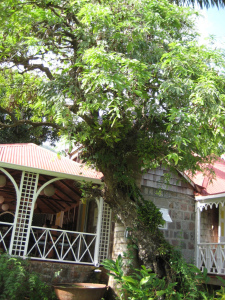 I’m nearing overload…woke with another headache that blossomed into a migraine later in the afternoon, but still managed to enjoy lunch on the terrace with my cousin at The Hermitage Plantation Inn. The owners weren’t around, unfortunately, but the receptionist kindly gave me an information sheet that shed some light on the site. There were 17 enslaved people listed for The Hermitage Estate in 1817, and that doesn’t seem like enough people to run a sugar plantation. It seems the estate originally farmed tobacco, indigo, cotton, and spices before eventually turning to sugar. That might explain the small number of slaves. The Pembertons eventually owned larger plantations but kept the old homestead for invalid members of the family. “Black Dog” might have
I’m nearing overload…woke with another headache that blossomed into a migraine later in the afternoon, but still managed to enjoy lunch on the terrace with my cousin at The Hermitage Plantation Inn. The owners weren’t around, unfortunately, but the receptionist kindly gave me an information sheet that shed some light on the site. There were 17 enslaved people listed for The Hermitage Estate in 1817, and that doesn’t seem like enough people to run a sugar plantation. It seems the estate originally farmed tobacco, indigo, cotton, and spices before eventually turning to sugar. That might explain the small number of slaves. The Pembertons eventually owned larger plantations but kept the old homestead for invalid members of the family. “Black Dog” might have been a house servant or she might have worked in the garden or with the crops (or all of the above). Of course, I had to ask all the employees I saw if they had ever seen a ghost. The first two said, “No–and I don’t want to!” But then they directed me to the receptionist and she had many sightings to report. Another employee told us about the tamarind tree (above) where slaves were apparently sold (or punished?)—the tree is covered in fruit but apparently none of it is edible…
been a house servant or she might have worked in the garden or with the crops (or all of the above). Of course, I had to ask all the employees I saw if they had ever seen a ghost. The first two said, “No–and I don’t want to!” But then they directed me to the receptionist and she had many sightings to report. Another employee told us about the tamarind tree (above) where slaves were apparently sold (or punished?)—the tree is covered in fruit but apparently none of it is edible…
I came home with a migraine but felt better after lying down for a while and went back out to meet three of my cousins. They took us to meet Uncle Fred who lives in Brown Hill, the village where my father grew up. I asked Uncle Fred if it was true that Brown Hill was the site of the first slave rebellion. He said when he was a boy, he used to gather up cannon balls that littered the side of the hill. Apparently when the slaves rebelled, the British called in naval reinforcements and the ship(s) bombarded the hill. He also told us that he once was in a field that had several holes, and when he asked another person what the holes were for, he was told that pregnant slaves had been laid belly down when they were whipped so that the unborn baby (property) would be protected. Oral history, y’all…
Tomorrow we’re going to 8:30 church service at St. John’s and then we’re meeting two cousins to have a traditional Nevisian breakfast—johnny cakes, saltfish, banana pancakes, ham, eggs….
Just heard the verdict. Glad I’m not in the US right now. Just too weary to write any more…


July 11, 2013
touching history
Today I had breakfast with a feral cat. I was hoping a bananaquit would come and beg for sugar but instead a sleepy little stray came and begged for scraps. Since I was having pancakes I offered to pet him instead but he didn’t know what to do with himself—too giddy and skittish and hungry for attention. Finally he settled near my feet and dozed, and when I finished eating I got closer to try again; he was more settled but the poor thing was so desperate he ended up following me all the way back to my cabin, and when I closed the door he sat at the screen and yowled! I immediately washed my hands when I got inside since I’m allergic to cats, and then moments later felt so woozy I had to lie down. Was it the cat? I hate to blame the little guy but may have to avoid him for the rest of the week…
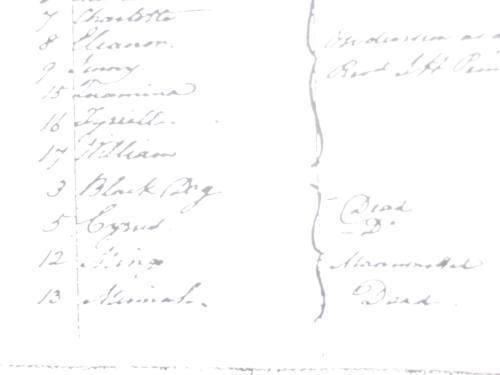 I can’t write about everything but I want to get some things down in here. I started the day at the historical society; the ladies who work there remembered me and were very helpful, immediately finding the documents I needed. I started by examining the slave registers since I wanted to find out whether “Black Dog” lived into her 60s. She was 60 in the 1817 slave register for the Hermitage Estate but sadly didn’t survive up until the next survey taken in 1823. I still don’t know why she was named “Black Dog” but the owners of The Hermitage Plantation Inn have agreed to talk to me about the history of the place. There were only 17 enslaved people on that estate so I wonder if she was a domestic slave rather than a field laborer. Did she have children? A lover? The house on the site is from the 1740s, thought to be the oldest wood structure in the Antilles. Based on her age, she may have been brought (or born) there when the house was still quite new. Did I mention that her owner was a man of the cloth? Reverend Joseph Herbert Pemberton and his brother Walter. By 1823 it looks like Walter didn’t own any slaves—maybe he saw the light?
I can’t write about everything but I want to get some things down in here. I started the day at the historical society; the ladies who work there remembered me and were very helpful, immediately finding the documents I needed. I started by examining the slave registers since I wanted to find out whether “Black Dog” lived into her 60s. She was 60 in the 1817 slave register for the Hermitage Estate but sadly didn’t survive up until the next survey taken in 1823. I still don’t know why she was named “Black Dog” but the owners of The Hermitage Plantation Inn have agreed to talk to me about the history of the place. There were only 17 enslaved people on that estate so I wonder if she was a domestic slave rather than a field laborer. Did she have children? A lover? The house on the site is from the 1740s, thought to be the oldest wood structure in the Antilles. Based on her age, she may have been brought (or born) there when the house was still quite new. Did I mention that her owner was a man of the cloth? Reverend Joseph Herbert Pemberton and his brother Walter. By 1823 it looks like Walter didn’t own any slaves—maybe he saw the light?
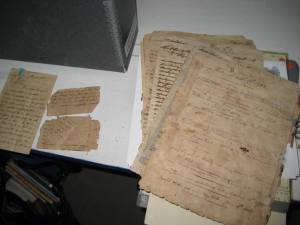 Next I asked for information on the Huggins case, and believe it or not, that story just gets worse. So the “insurrection” that took place on the Montravers Estate was caused by an accusation of theft—an enslaved man allegedly stole something from a free man of color. He was confronted by Huggins, confessed supposedly, and was whipped on the spot. Women who were related to the man being whipped started to cry (or “cry out,” depending on the witness) and in response, Huggins decided to give them something to really cry about. In response to the whipping of these women, the rest of the slaves decided to stage a work stoppage, it seems. And so Huggins had 32 of them publicly whipped. One enslaved woman was pregnant and cried out for mercy but none was shown. I found the Montravers register for 1817 and found some of the named slaves (Catherine, Castile, Range, Quashie, the two Jubas). I also found a plain white envelope that was filled with tattered letters addressed to Edward Huggins, Jr.! They didn’t relate to the case and were from the 1850s but it still felt amazing to sift through them. I felt like I needed to be wearing those white felt gloves…
Next I asked for information on the Huggins case, and believe it or not, that story just gets worse. So the “insurrection” that took place on the Montravers Estate was caused by an accusation of theft—an enslaved man allegedly stole something from a free man of color. He was confronted by Huggins, confessed supposedly, and was whipped on the spot. Women who were related to the man being whipped started to cry (or “cry out,” depending on the witness) and in response, Huggins decided to give them something to really cry about. In response to the whipping of these women, the rest of the slaves decided to stage a work stoppage, it seems. And so Huggins had 32 of them publicly whipped. One enslaved woman was pregnant and cried out for mercy but none was shown. I found the Montravers register for 1817 and found some of the named slaves (Catherine, Castile, Range, Quashie, the two Jubas). I also found a plain white envelope that was filled with tattered letters addressed to Edward Huggins, Jr.! They didn’t relate to the case and were from the 1850s but it still felt amazing to sift through them. I felt like I needed to be wearing those white felt gloves…
After the historical society I took the bus to my aunt’s house for a delicious bowl of soup. I also had a chance to test out my new video camera and boy, did my aunt have stories to tell! I learned things about my father that I never knew before, and more details about my grandmother’s short, mysterious life. Blackie, the funeral director here, is one of my cousins and apparently his mother Dovie may have information about Rosetta. So I need to find a way to meet them. Tomorrow I head to St. Kitts to meet Leonard Stapleton who is the person that told me about the Huggins case. He works at Brimstone Hill Fortress and is an expert on the island’s history so I’m looking forward to seeing his research. And while I’m there I’ll stop by the records office; hopefully they will have something on Rosetta’s medical history. The asylum in Antigua has no records from that era, but I found someone in the Registrar’s office who offered to do a search of the archives for a death certificate at least. I suppose there’s a remote chance that Rosetta is still alive, though she’d be nearing 100. Wherever she is, I hope she knows that people still speak her name. She was banished by not erased, not forgotten…


July 10, 2013
a sign
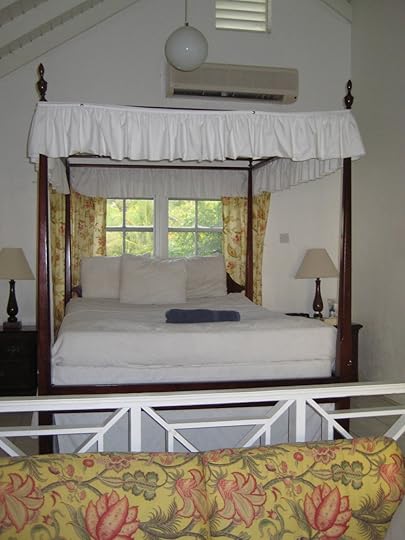 I’m here—in a pretty little bungalow that’s a virtual replica of the one I stayed in last year! I set my alarm for 5am but woke at 3 this morning; felt a headache coming on so got up and got ready to head to the airport. My driver was a lovely man from Guinea and we made it ALMOST the whole way to the airport before he asked—as all taxi drivers in NYC do–”Are you married or single?” We discussed the political crisis in Egypt, the violence in Syria, the instability in neighboring Mali (which he fears will spread to Guinea). We talked about the importance of education and the high cost of travel between countries in West Africa and the Caribbean. But just as the airport came into view, he asked about my marital status.
I’m here—in a pretty little bungalow that’s a virtual replica of the one I stayed in last year! I set my alarm for 5am but woke at 3 this morning; felt a headache coming on so got up and got ready to head to the airport. My driver was a lovely man from Guinea and we made it ALMOST the whole way to the airport before he asked—as all taxi drivers in NYC do–”Are you married or single?” We discussed the political crisis in Egypt, the violence in Syria, the instability in neighboring Mali (which he fears will spread to Guinea). We talked about the importance of education and the high cost of travel between countries in West Africa and the Caribbean. But just as the airport came into view, he asked about my marital status.
HIM: Are you married or single?
ME: Single.
HIM: It’s better to be married.
ME: Maybe for men it’s better. I’m not so sure it’s better for women. Not for me, anyway.
HIM: You just have to choose the right person. Women today want to be independent but they choose the wrong person. God will choose the right person for you.
I didn’t bother to respond to that. Still, we parted on good terms and I gave him a nice tip because I thought of my students when he revealed that he could barely write his own name when he arrived in the US fifteen years ago. “Education is everything.” It certainly is. I hauled my book-filled bag into the terminal and onto the scale—I had my wallet open because I knew there would be a surcharge for the extra weight. But the attendant just put the sticker on my suitcase and told me to drop it on the conveyor belt. Security was a breeze…it was amazing. We landed on time and since I was seated at the back of the plane, I was one of the first people to exit via the rear stairway. I was the FIRST person to clear customs, I got my bags, and had plenty of time to spare before the 1pm ferry left St. Kitts for Nevis. The sea was choppy, perhaps as residual effect of Hurricane Chantal, but I just closed my eyes and focused on my breathing. Somehow lurching back and forth doesn’t affect me if I can’t actually see the boat bobbing up and down. When i got off the ferry, Marva Roberts from the Nevis Library Service was there to meet me and she and her daughter drove me to my hotel—all the while filling me in on the many exciting literacy events they’ve held in the past year. I don’t know what it is about librarians, but they’re just awesome. I think it’s that they love books and want others to love books, too. Later this week I’ll meet with the librarians at Charlestown Secondary School to give them the forty books I brought from New York. I actually broke my suitcase hauling those books off the ferry but now that they’re here in my room, they seem rather inadequate. I wish I had 100 books to give…
 My 3am headache has hung around all day but I’m hoping a good meal and a good night’s rest will clear it up. I flopped on the lovely four-poster bed this afternoon and got annoyed when a bird started chirping RIGHT outside my window. This little bungalow has 5 windows, including one right behind the bed and I swear that bird was deliberately sitting on the window ledge so she couldn’t be ignored. I finally dragged myself up and put my glasses back on only to find…a hummingbird! It wasn’t doing all the chirping, it was too busy feeding from the flowering tree outside my window. I watched it for almost a minute before it flew away. So thank you, little squeaky bird, for annoying me enough to draw my attention to the very bird that has led me on this journey.(It was a Green-Throated Carib, I think)
My 3am headache has hung around all day but I’m hoping a good meal and a good night’s rest will clear it up. I flopped on the lovely four-poster bed this afternoon and got annoyed when a bird started chirping RIGHT outside my window. This little bungalow has 5 windows, including one right behind the bed and I swear that bird was deliberately sitting on the window ledge so she couldn’t be ignored. I finally dragged myself up and put my glasses back on only to find…a hummingbird! It wasn’t doing all the chirping, it was too busy feeding from the flowering tree outside my window. I watched it for almost a minute before it flew away. So thank you, little squeaky bird, for annoying me enough to draw my attention to the very bird that has led me on this journey.(It was a Green-Throated Carib, I think)
On the plane I sat next to a young woman who looked very familiar. She offered me a piece of gum as the plane took off, and then draped a blanket over her head and slept the rest of the way. We chatted a little at the airport and it turns out she’s a student at Hunter College! I gave her my card when we got off the ferry (she gave me a hug!) and asked her to email me so I could possibly interview her for the book. I’m going to interview my cousin tonight after dinner (if we can stay awake). And my aunt is making me soup for lunch tomorrow, which I desperately need since neither my inhaler nor the cough syrup I’m taking seems to have much effect…
I’m here–can’t say “I’m home,” but I did feel something like pride when the ferry pulled up and I could see Nevis Peak stretching up into the clouds. Plus the man who sat next to me on the ferry had a chuckle just like my Dad’s! I’ve never heard *anyone* laugh that way. It must be a Nevis thing…


July 8, 2013
brace yourself
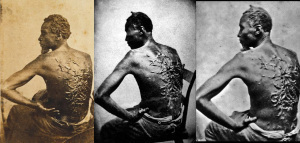 I haven’t blogged much lately. Partly because I was trying to finish Judah’s Tale (I didn’t) and partly because I can’t stand to spend too much time thinking about all the bad news in the world lately (I’m looking at you, SCOTUS). Right now Gasland II is on in the background but I’m not really watching because I’m thinking about islands—England and Nevis. I spent an hour earlier this evening perusing the correspondence of esteemed British gentlemen on either side of a gruesome 1810 case in Nevis in which a planter was accused of cruelly punishing his enslaved men and women. Their crime? Not doing their work and threatening to leave the plantation. I leave for my fourth trip to Nevis soon and I’m not sure what to expect. A year has passed since I was there last and I haven’t done much writing on The Hummingbird’s Tongue. I’ve given it a lot of thought, however, and will be presenting on experimental writing at a Commonwealth literature conference in early August. It’s time to give these ideas some kind of form, but what do you do with this?
I haven’t blogged much lately. Partly because I was trying to finish Judah’s Tale (I didn’t) and partly because I can’t stand to spend too much time thinking about all the bad news in the world lately (I’m looking at you, SCOTUS). Right now Gasland II is on in the background but I’m not really watching because I’m thinking about islands—England and Nevis. I spent an hour earlier this evening perusing the correspondence of esteemed British gentlemen on either side of a gruesome 1810 case in Nevis in which a planter was accused of cruelly punishing his enslaved men and women. Their crime? Not doing their work and threatening to leave the plantation. I leave for my fourth trip to Nevis soon and I’m not sure what to expect. A year has passed since I was there last and I haven’t done much writing on The Hummingbird’s Tongue. I’ve given it a lot of thought, however, and will be presenting on experimental writing at a Commonwealth literature conference in early August. It’s time to give these ideas some kind of form, but what do you do with this?
Witness went and sat down in Dr. Crosse’s gallery–Says, that two drivers continued flogging said negro man for about fifteen minutes.–Says, that as this man appeared to be severely whipped, he was induced to count the lashes given the others, conceiving the country would take up the business.–Says, that defendant gave one man 115 lashes; to another 65; to another 47; to another 165; to another 242; to another 212; to another 181; to another 59; to another 187; to a negro woman 110; to another woman 58; to another woman 97; to another woman 212; another woman 291; another woman 83; another woman 49; another woman 68; another woman 89; and another woman 56.
Witness says, that the woman who received 291 lashes, appeared to be young, but most cruelly flogged.
I’m hoping to find the original court documents. I have a few names: Quashy, Ned, William Coker, Nellys Juba, Madges Juba, Catherine, Castile, and Range. Then a slew of witnesses—all white men, of course—testified that they had seen punishments just as severe elsewhere. In other words, this kind of torture was not unusual or extraordinary in the Caribbean at that time. The planter, Edward Huggins, was found not guilty by a jury of his peers but abolitionists back in England used reports of this case to further their cause. I don’t know if I’ve got all my facts straight, but I believe these brutalized men and women worked on the Montravers Estate, and I will be touring the ruins sometime this week. I used some of my grant money to buy a video camera but I’m not sure if there’s any point filming the ruins of a plantation. It reminds me of Claude Lanzmann’s footage of demolished concentration camps. Why document an absence, show what’s no longer there? Because there’s a residue that persists. I need to write…
 Last night I was angry, wishing I hadn’t scheduled the trip for this month. I haven’t finished Judah’s Tale and I can’t gain momentum when I’m constantly shifting my attention to other projects. I have yet another article to revise and swear I will NEVER submit my work to another academic journal. My bad mood took a turn for the worse when I realized that given the choice, I’d rather go to Oxford. I’ve been watching Inspector Lewis lately, which is filmed in Oxford, and there was one shot where two characters were walking by the river and the path went past a golden, walled building that had a gorgeous border of shrubs and flowers. It was a gloomy day, the actors were wearing autumn clothes…one of the suspects worked in a tea shoppe. And the truth is, that is my dream. I don’t like hot weather; I’m not a tropical kind of girl. We’re in a heat wave right now, which might account for my miserable mood. And I realize that when I think about Nevis, I don’t think about serenity. And perhaps that’s why it has taken me so long to start writing this book. My own discomfort around this history, my own family history, the climate, the landscape–it’s hard to look at sometimes (my discomfort, that is). And that’s how I know this book will be SHORT. It’s too hard to balance my shameless fixation with British culture against my righteous indignation at the lasting damage of slavery and colonialism–part of which IS my fixation with British culture…
Last night I was angry, wishing I hadn’t scheduled the trip for this month. I haven’t finished Judah’s Tale and I can’t gain momentum when I’m constantly shifting my attention to other projects. I have yet another article to revise and swear I will NEVER submit my work to another academic journal. My bad mood took a turn for the worse when I realized that given the choice, I’d rather go to Oxford. I’ve been watching Inspector Lewis lately, which is filmed in Oxford, and there was one shot where two characters were walking by the river and the path went past a golden, walled building that had a gorgeous border of shrubs and flowers. It was a gloomy day, the actors were wearing autumn clothes…one of the suspects worked in a tea shoppe. And the truth is, that is my dream. I don’t like hot weather; I’m not a tropical kind of girl. We’re in a heat wave right now, which might account for my miserable mood. And I realize that when I think about Nevis, I don’t think about serenity. And perhaps that’s why it has taken me so long to start writing this book. My own discomfort around this history, my own family history, the climate, the landscape–it’s hard to look at sometimes (my discomfort, that is). And that’s how I know this book will be SHORT. It’s too hard to balance my shameless fixation with British culture against my righteous indignation at the lasting damage of slavery and colonialism–part of which IS my fixation with British culture…
So bear with me. It could be a bumpy ride.


July 2, 2013
worth a thousand words…
I saw this illustration on Facebook today and just had to share. It’s on illustrator Tina Kugler‘s blog and she created it after discovering the abysmal stats compiled by the CCBC. This really says it all…


June 29, 2013
shiver
The only good thing about having a summer cold during a heat wave is that it keeps me at home, which is where I get most of my writing done. Last week I was out and about every single day, but since waking with a sore throat on Monday, I’ve pretty much been out of commission. I had one day of fun on Thursday, but I’ve been housebound otherwise and that’s led to increased productivity: last week I wrote 4500 words and so far this week I’ve written 6000 words. I’m hopeful that between naps and coughing fits, I’ll be able to write at least 1500 words today and tomorrow. That would put this first draft of Judah’s Tale at 85K words. I am determined to NOT go over 90K. On Friday I got an offer for The Deep. I’m not sure how/if that’s going to work out, but I’ll keep you posted. Right now I want to get my voice back so I can read at tomorrow’s festival and plead my case for greater diversity when I meet with my publisher on Tuesday…
If you’re in Brooklyn, stop by St. Francis College tomorrow afternoon for the WORD Caribbean Book Festival. My reading & panel starts at 5:30. I’ve been listed as a Nevisian author so the first thing I’ll have to do is break that down…







